Love in the Lost and Found
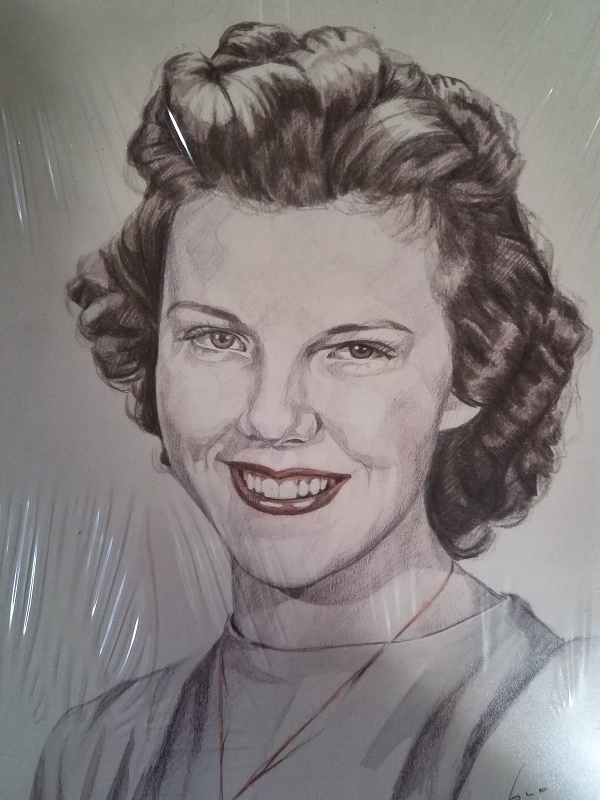
In January, 2016, my 94-year-old mom, Ruby, fell in her bathroom in Tucson, Arizona. A blood clot traveled from her hip, still bruised and sore from two falls the previous week, to her brain, causing a massive stroke.
Minutes after the ambulance crew wheeled Mom into the hospital, my brother, John, who’d moved to Tucson from Oahu three years earlier to be near her, phoned me with the news. At his insistence, the doctors kept Mom hooked up to life support in the hospital until I arrived.
I’d phoned my mother every day for the past five years, ever since a botched surgery to remove a tumor on her intestines generated a second surgery and she almost died. I couldn’t bear the thought of my kind, creative, supportive Mom slipping away with no chance to say goodbye.
My husband Barry soothed me with hugs and promises to take care of everything in my absence, including his 98-year-old, Alzheimer-ridden mom, Lily. He and I had moved into Lily’s home in the hills above Honolulu three years earlier, to help with her care.
The following morning, I flew, grieving, to Tucson, my own life support system unplugged. Through six raw days, John shared his sorrow with me, the only sister he fully trusted.
Our other two sisters, Kay and Lucy, picked me up at the airport, drove me to Mom’s apartment, and drove off with Mom’s new Nissan Caravan, leaving me stranded in a strange city. I phoned John, who drove me to his home, handed me the keys to Mom’s old Lincoln, led me back to her apartment, and gave me directions to hospital and grocery stores. Mom wished for her four children to get along after she died, but her dying postponed everything but grief.
I cherish that night I stayed in Mom’s retirement apartment, surrounded by familiar trappings of our earlier life – classic books for my former Spanish teacher mom; military histories for my dad; precious stones he bought in Vietnam and made into jewelry after he retired; cut glassware, figurines and beer steins from Germany, where I was born; albums and prints of family photos – that pulled me back into the past. A picture centered over the mantelpiece, taken in Spain during the late 50s, showed Mom, beautiful, elegant, thirty-something mother of four, standing beside handsome Air Force pilot, Dad. On that night in Mom’s apartment, I wrapped myself in a blue bathrobe she’d sewn on the old White sewing machine she bought the year I was born. Nestled in her adjustable hospital bed, I talked with the ghosts of my family past.
The next day, the hospital unhooked Mom from life support – doctors could do nothing more due to her massive brain damage. She continued to breathe on her own. John and I moved into a hospice room with her, taking turns sleeping on a roll-out sofa. John brought his laptop and showed me slideshows of hundreds of family pictures, old and new, walking me with him through memories, some of which I’d forgotten. We rubbed lotion on Mom’s papery skin, wet her parched lips with a swab soaked in water — a nurse forbade us to give her more, lest she choke — whispered to her vacant face, and prayed for a miracle that never came. After we finally admitted defeat, John and I told her again and again, “We love you dearly, Mom. Kay and Lucy do, too. Don’t worry, we’ll all be okay.”
I cried so long and hard in that air conditioned, desert-dry room that, three days later, a blood vessel in my left eye painfully burst, coloring my eye crimson. To prevent a recurrence of a recent corneal ulcer, my ophthalmologist suggested warm compresses and a quick return to the moist atmosphere of Hawai’i.
The night before I flew home, I rubbed lotion on Mom’s desert-dry skin, and prayed she wasn’t feeling the pain of thirst. Believing that people in a coma can still hear, I spoke softly in Mom’s ear, explaining why I was leaving and repeating that I loved her.
The next morning, when a taxi arrived to take me to the airport, Mom still lay in a coma, her breathing labored but softer now. Falling asleep on the plane, I dreamed Dad flew a military tanker like the one I’d flown on after he arranged for John and me to fly to Alaska some forty years earlier. In my dream, my father joyfully announced he was coming to take Ruby home.
When I arrived back in Hawai’i, I phoned John. Weeping, he said, “Mom stopped breathing two hours ago.” I told him my dream and how happy Dad seemed. He responded, “Thank God they’re together and she’s out of pain.”
Mom was the rock John rested on. After falling down stairs and breaking all his ribs in Hawai’i, he lost his caretaking position, and Mom took him in. When he found a high-paying job in Tucson, she helped him with a down payment for a lovely desert home. He’d always wanted a home, but couldn’t afford one in Hawai’i.
Knowing Mom would approve of me comforting John soothed me. Certain her soul would survive death, I hoped she would visit me after she passed.
Hers would not be the first after-life presence I’d encountered. Following his 50th high school reunion in Missouri, my father died at the hands of a drunk driver. Back in Hawai’i a week later, I grieved, convulsively crying until I couldn’t cry any more. The next thing I remember was Dad, wearing his flight suit, hugging me, his loving presence surrounding me. I don’t know if I dreamed him or actually saw him.
The night before my Great Aunt Tisie died, Mom and I visited her in her retirement home. Tisie and I’d corresponded for years, and I think she wanted to see me before she passed. Our last night together, I sponge-bathed her soft, wrinkled skin. The next day, she fell, breaking her pelvis. The night after that, she returned the favor, bathing me in bright white light.
John loved our mother with his whole heart. Whenever she needed anything, he ran to her rescue. With her gone, grief sucked him into despair like quicksand. Wanting to ease his pain, I mailed him a copy of Mike Dooley’s book, “The Top Ten Things Dead People Want to Tell You.” He said this book gave him something to hold onto.
“Like you gave me,” I told him, “when I flew to Tucson and you took me under your wing. Mom loved you so much, Johnny. Every day, she bragged about you and told me how much you helped her.”
The first few days back on Oahu, grief slapped me hard. A nurturer even now, Mom comforted me. The night after she passed, I felt her presence, and dreamed her essence flowed through me like a warm, sparkling wave. Barry saw her rise from my sleeping body, a bright angel, looking like a stunningly beautiful woman again.
Mom liked birds; she named the mom and baby roadrunners she’d fed outside of her and Dad’s country home “Bird baby” and “Bird baby’s baby.” At Lily’s home, Mom took the form of a red-headed cardinal, hopped onto the hood of my green Hyundai Elantra, and looked me in the eye. She cocked her head and I spoke to her, chills tingling along my spine, delight building in me at this testimonial that love doesn’t end.
The day after I saw Mom as a cardinal, a young feral cat with white paws and brown tortoise-shell markings ran from me when I hung clothes on the porch. She looked as thin as a stick, her tiny ribs showing. A nervous little thing, her green eyes seemed to plead for help. I couldn’t let her starve. Mom, who’d fed crowds of quail in her neighborhood, their babies looking like large popcorn kernels with topknots, wouldn’t have let her starve either.
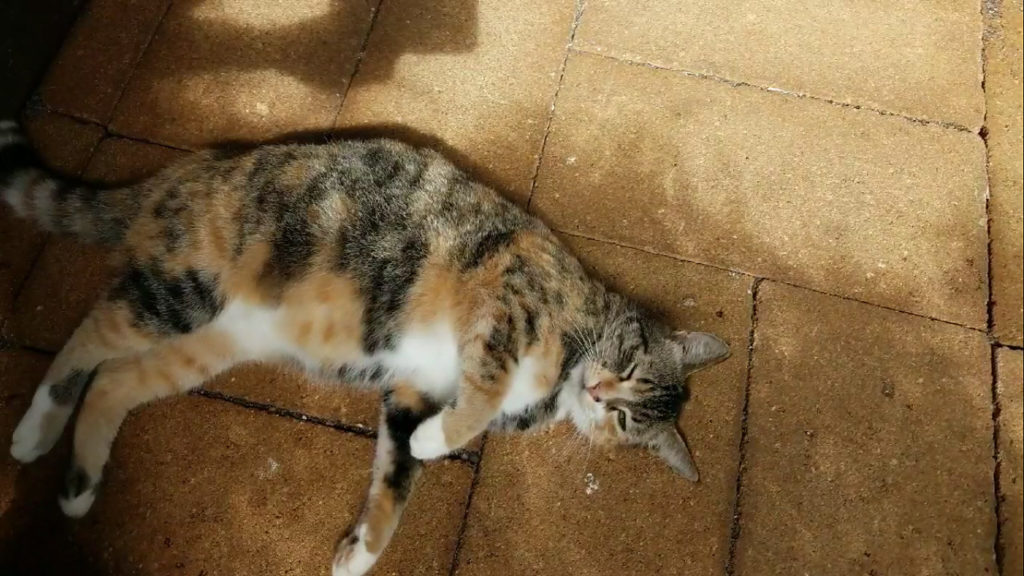
I left tasty scraps for the cat. Six weeks later, I spotted a white, and then a yellow, newborn kitten behind a cardboard box, their little pink mouths suckling mama, their tiny toes kneading her underbelly. Mama Kitty stared at me, panting and growling, warning me she would attack if I stepped closer. I stepped back, thinking about the time Mom chased a neighborhood bully away, and told Mama Kitty, “My mom would have fought to keep me safe, too.”
To provide entertainment for Lily, I hung a bird feeder in a Madagascar Dragon Tree. Two weeks later, a few wild green parrots and cardinals, and dozens of rice birds, fought for rice and black sunflower seeds. Lily sat on her long couch, gazing through a picture window, watching. A few months after the kittens arrived, she pointed at them playing among ferns, batting at anthurium plants, and chasing birds as we watched through the windows overlooking the overgrown backyard she’d planted 60 years earlier. Her eyes followed the kitties climbing the Dragon Tree until the birds flew away.
Lily would laugh. “Dumb cats,” she’d say. “They’ll never catch those birds.” Fortunately, she didn’t see the bloody dove and rat carcasses our doting cats surprised us with in the garage.
Before I fell in love with Barry, Mom met Lily when she worked as the office manager in Barry’s chiropractic office. While waiting for Barry to adjust me, the two moms chatted happily, and Mom told me she liked Barry’s well-read, feisty mother. Even so, she didn’t want me to move into Lily’s house a few years later. She thought I owed it to myself to enjoy the retirement I’d earned after 37 years of working for Uncle Sam.
I explained that kind, spiritual Barry wanted to help his mom, now suffering from severe Alzheimer’s, and I wanted to help him. “Because, Mom, he helped me so much. He fixed my back when nobody else could.”
On a rainy day two years after Mom passed, when Lily stared vacantly into space and nothing I could say reached her, Mom found a way to get through. Lily startled me with sudden questions, her eyes sparkling and clear, “Where did you live in Spain, Liz? Was it 1959? You were eight years old, right? You still speak Spanish, don’t you? Tell me about those castles in the countryside.”
No way could Lily have remembered I’d lived in Spain. Mom must have been whispering inside her mind, delighting her with tales of abandoned castles, of riding the Tranvia, the trolley, for 50 centavos. Of being forbidden to say Franco’s name in public while speaking English. How else could Lily possibly know? Delighted to discover a little magic in this overwrought home, I breathed deeply, relieved, and whispered, “Thanks, Mom.”
In November, 2018, hospice came into Lily’s home, bringing a hospital bed, wheelchair, nurse, and caregivers. Lily drew her last breath on June 10, 2019. On July 5, Barry’s siblings texted Barry, asking us to move so they could clean the house and list it quickly. Our 6-1/2 year caregiving stint suddenly at an end, my inheritance from Mom made our move a whole lot easier.
Barry phoned me at Whole Foods with the news that we needed to find a new home. I phoned our former real estate agent and asked him if he knew of any house rentals with fenced yards, so we’d have a place for our outdoor cats. He immediately looked up his clients with rentals and gave me two listings.
The following Monday morning, July 8, we drove to the closest rental. At first sight, we knew we wanted us to rent the small cottage with the big yard, lots of Hawaiian plants, and two large wooden storage houses. A young military couple also wanted the place, and we all agreed to meet again the next day, when the property manager would have the house key and give us a look inside.
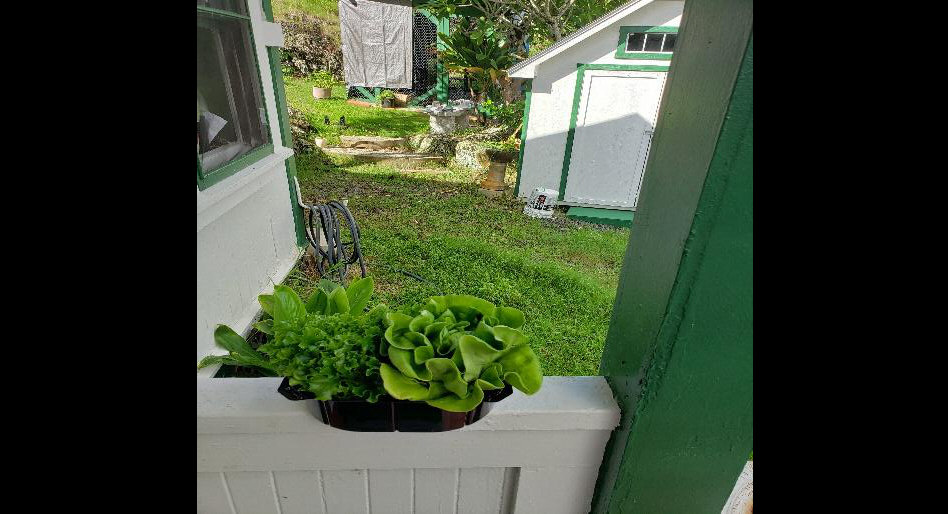
I prayed all the way home. The next morning, a glance outside through the picture window revealed a cardinal sitting on the window’s edge, head cocked, looking at me. Joy bubbled through me like champagne.
Barry and I signed the contract for the cottage on Wednesday, July 10. On August 25, our handyman completed an 8 by 8 by 10 foot enclosure with shelves on the walls so the cats could climb, and a doghouse in the corner, so they could hide. We would need to keep them locked up for three months until they got used to the new place and wouldn’t run away.
We’d trapped our cats once before, when we’d gotten them fixed. This time, we baited the cages with Kentucky Fried Chicken placed beneath the wire bottoms. The setup forced the cats to enter and walk all the way to the back, thus springing the trap. Barry carried the traps with squirming cats into my car, then into the vet’s office. She applied flea treatments and gave our three pretties distemper shots in spite of them leaping and fighting like strong little tigers.
We drove the frightened cats straight from the vet to our new home, releasing them into their enclosure. Latching their door and unlocking ours, we spent our first afternoon in the tiny cottage, which seemed huge in comparison to the bedroom we’d endured for the past 6-1/2 years.
Barry’s grief for his mother didn’t alter his unfailingly kindness toward me. “Remember why we moved to Mom’s house,” he said. “To help and protect her. We did. You were the best caregiver my mom had, Liz. Her spirit knows that. I love you. Thanks for helping me.”
We hugged and kissed and ate Haagen Daz vanilla ice cream, savoring our first time alone in our own little cottage. It felt like a honeymoon.
As twilight neared, I stepped outside. On the peak of the A-shaped storage house, a red-headed cardinal looked at me, cocked her head, and flew into the golden pink sunset.
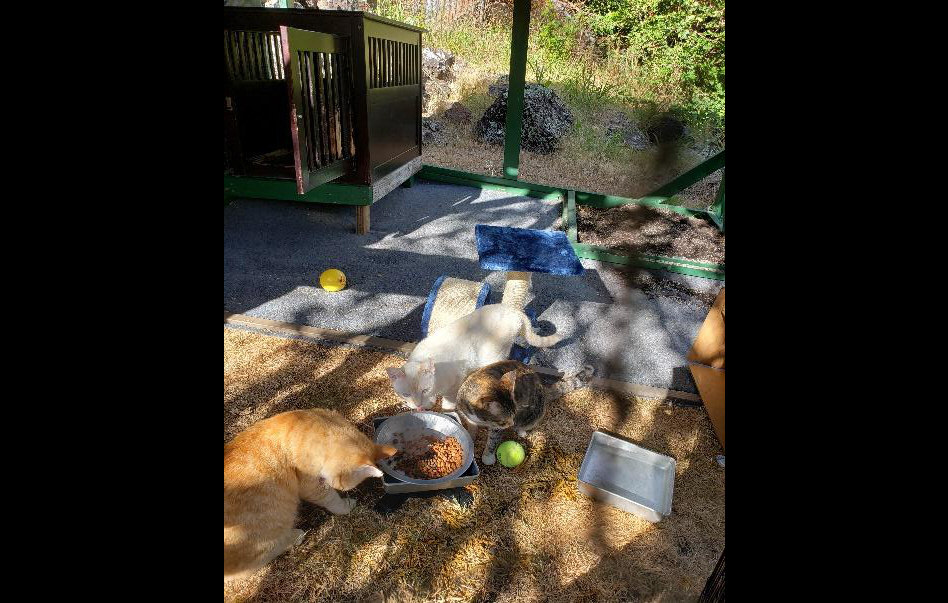
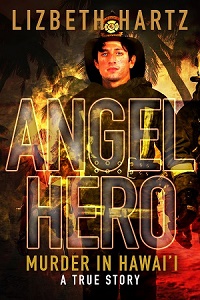
Lizbeth Hartz is the author of the true crime, true love memoir Angel Hero, Murder in Hawaii, A True Story. Get it on Amazon or sign up to read the 1st chapter free.